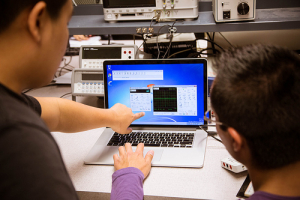December 9-15, 2013 is National Computer Science Education Week, and the non-profit organization Code.org is using the week to promote their One Hour of Code initiative. According to Code.org, the flagship week-long celebration is meant to coincide with the 107th birthday of Admiral Grace Hopper, an early American computing pioneer.
According to their website, Code.org “is a non-profit dedicated to expanding participation in computer science education by making it available in more schools, and increasing participation by women and underrepresented students of color.”
In a 2-minute video posted on YouTube by Code.org, celebrities and policymakers alike (such as Ashton Kutcher, Shakira, New Jersey Senator Cory Booker and U.S. President Barack Obama) join students and professionals around the world to encourage everyone to spend one hour this week learning to code, using one of many tutorials offered on Code.org.
“Learning these skills isn’t just important for your future, it’s important for our country’s future,” Obama said in his own individual video posted by Code.org. “If we want America to stay on the cutting edge, we need young Americans… to master the tools and technologies that will change the way we do just about everything.”
The need for an increase in STEM (science, technology, engineering and mathematics) education among U.S. students has become more and more apparent over the last few decades. In 2000, the Organisation for Economic Co-operation and Development implemented the Programme for International Student Assessment, which assesses the performance of 15-year-olds in 33 countries in the areas of math and science literacy every three years. Since the initial testing, U.S. students have consistently scored lower than at least 17 of the 33 tested countries in math, including South Korea, Finland, Switzerland, Japan, Canada and the Netherlands. In the science tests, the United States also fell below 12 other nations in 2009.
In 2011, the World Economic Forum ranked the United States 52nd in the quality of STEM education as well as 5th (and declining) in overall global competitiveness. According to the Organisation for Economic Co-operation and Development, the United States ranks 27th in developed nations in the proportion of college students receiving undergraduate degrees in STEM fields. The Task Force on the Future of American Innovation says there are more foreign students studying in the U.S. graduate schools than U.S. students, and the National Science Foundation says over two-thirds of the engineers who receive Ph.D.’s from U.S. universities are not U.S. citizens. Unfortunately, the statistics don’t lie. The United States is falling behind its international competitors in STEM education, and American students simply aren’t keeping up with their international colleagues’ STEM knowledge.
At the University of Houston, however, faculty and students are working toward a brighter, more STEM-literate tomorrow. Dr. Bonnie Dunbar, M.D. Anderson Professor and Director of Aerospace Engineering, heads the UH STEM Center, which aims at increasing STEM literacy for all Americans, particularly K-12 students.
The UH STEM Center serves as the coordinating office for all STEM programs and outreach initiatives across the UH campus. UH offers a huge variety of STEM outreach programs which impact each and every section of the STEM pipeline, from kindergarten through high school education, to parent engagement, to media coverage of STEM topics. Such programs include training courses for teachers in STEM fields as well as summer camps for high school students considering pursuing STEM degrees in college. The UH Cullen College of Engineering houses two of the most popular and successful STEM camps for high school juniors and seniors – G.R.A.D.E. Camp for high school girls and STEP Forward Camp for underprivileged high school juniors and seniors. In addition to helping coordinate and support these programs, the UH STEM Center plays a central role in the support, planning and execution of the annual Mars Rover Celebration for elementary and middle school students as well as the Science Engineering Fair of Houston for middle and high school-aged students.
Individual faculty members and students at the Cullen College also contribute directly to increasing STEM literacy and engagement among local elementary, middle and high school students. Dr. Jose Luis “Pepe” Contreras-Vidal, professor of electrical and computer engineering and biomedical engineering in the UH Cullen College of Engineering, often takes his research on robotics and programming directly into Houston-area classrooms. Thanks in part to a grant from Schlumberger, Dr. Contreras-Vidal and engineering undergraduate students have taken small dancing, soccer-playing robots to Houston-area elementary school classrooms to teach K-12 students basic programming in order to make the robots dance, wave, stand or sit. The ultimate goal of Dr. Contreras-Vidal and his team of undergrads, however, is to inspire young students to pursue science and engineering careers.
Code.org also understands the importance of instilling an interest in STEM fields at a young age and is offering coding tutorials online for students as young as five years old. According to Code.org co-founder and CEO Hadi Partovi, “Every 21st century child can benefit from learning this foundational field.”
And if the idea of furthering both your personal career and your country’s future isn’t enough, Code.org is offering prizes to schools and educators who have their classes participate in the hour of code, including storage space on Dropbox, video conference calls with technology leaders like Bill Gates, Skype credits, and computers for the classroom.
